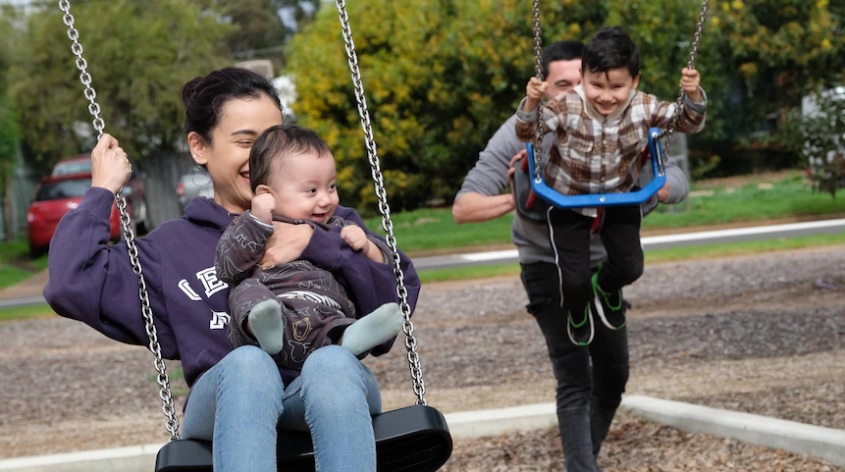Sadam can't wait for the moment his new baby takes his first steps.
It was something the Adelaide man missed the first time around — when his first-born son Lutfi started walking, it was thousands of kilometres away, in Xinjiang, north-west China.
For years, Beijing's policies against Uyghur Muslims kept Sadam, who migrated to Australia in 2009 and became a citizen in 2013, separated from his wife Nadila and the young child he had never met.
But he's now making up for lost time.
He was finally reunited with his wife Nadila and Lutfi in Australia in December 2020.
Since then, Nadila has started learning English, Lutfi has started school, and the couple has welcomed a new baby boy.
They named him Latif, meaning "kind".
"Whatever I've been going through … what China did to me, God has given me a second chance to have that time again," he says.
"I missed every [moment] of Lutfi's three-and-a-half years. But now I've got a little baby."
The birth of his second son in October was bittersweet for Sadam. It's a constant reminder of what he missed. He watched Lutfi grow up on a screen and in snatches.
But he is embracing fatherhood now — he loves being Lutfi's "favourite friend", and even the sleep deprivation and nappy changes are a gift.
Sadam remembers how nervous he felt the first time Lutfi went to preschool — his son couldn't speak English and he worried he might be bullied.
"But straight away he got lots of friends, even without the language," he says.
"That's the good thing about kids, they don't discriminate against each other by their colour or their religion.
"That makes me happy. Now time is flying. He's already almost five, he's growing up so fast."
Overcoming Xinjiang trauma
But it has been far from easy — he and Nadila had to re-learn how to be partners, and Sadam had to adjust to being a dad in person.
For the first few days, Lutfi called him "uncle" instead of "dad".
The couple met online in mid-2015 through a friend while Nadila was living in China and Sadam was in Australia.
He was smitten and flew to meet her in China, where they became engaged and later celebrated a religious wedding in Urumqi, the capital of Xinjiang.
They were living for a short time in Turkey when Nadila became pregnant with Lutfi.
She travelled back to China to give birth with her family nearby, while Sadam rented a home in Australia and filled it with furniture and toys for the baby.
That was in 2017, right as China's crackdown on Uyghurs and Muslim minorities was gathering force.
The timing of their temporary goodbyes "could not have been worse".
Chinese authorities had begun detaining more than 1 million Uyghurs in what Beijing describes as "vocational training centres", which it says are necessary to combat "terrorism and extremism".
But human rights groups and researchers have condemned Beijing's actions as arbitrary detention, forced labour and oppression of religious and ethnic minorities.
The US has labelled it genocide.
United Nations Human Rights chief Michelle Bachelet is under pressure to release a report on the treatment of the Uyghurs after a controversial visit to the Xinjiang, but Beijing has urged her to bury the findings.
Nadila and her new baby couldn't leave China. Her passport had been confiscated by police.
Sadam's visa application to China, so he could be in Urumqi for Lutfi's birth, was rejected twice without a reason being given.
The ripple effects of the trauma from their long separation, and what Nadila endured in Xinjiang, are still being felt.
Even though the young family now feels safe in Australia, painful memories have resurfaced.
Sadam recalls driving home after eating dinner out one night and being pulled over for a random breath test.
In the passenger seat next to him, Nadila was shaking.
"I asked her, 'What's going on, what happened?' She's like, 'Every time I see the police with the uniform, or hear the police car siren, I'm just shaking, scared'," he says.
"She felt like they came for her. So that was really breaking my heart."
Sadam, who has penned his story in a new book, Freeing My Family, didn't know the full extent of what Nadila faced in Xinjiang.
That was partly because authorities in China had ordered her to cut contact with her Australian-citizen husband. They could only communicate in fleeting messages.
The first time she was detained, it was for four days. Her parents waited outside the police station with Lutfi, a baby at the time, and would bring him to her to be breastfed.
Chinese authorities accused her of being a terrorist. Sadam and his lawyer, Michael Bradley, felt the urgency to get her and Lutfi out.
"At the time, it was very real," Mr Bradley says.
"We really did fear that there was high risk that she was just going to be disappeared, and separated from Lutfi.
"There was a lot of evidence that that was happening to a lot of families, and kids were being effectively orphaned and adopted out when their parents were being taken."
In the book Sadam doesn't sugar-coat his experience — he describes domestic violence in Uyghur families in China, getting into fights, being underpaid when he migrated to Australia, his struggles with drug addiction, and — especially during his battle to free Nadila — his spiralling mental health and thoughts of suicide.
He also revealed he made a "catastrophic series of choices" — chief among them was an illegal sham marriage in Australia in 2015, before he met Nadila.
He agreed to that marriage in return for a large payment from a woman who was seeking residency in Australia.
He didn't tell Nadila, and the decision would come to haunt him — it was the reason he had a religious ceremony with Nadila, rather than a legal one.
It damaged his credibility and further complicated his efforts to bring Nadila and Lutfi to Australia.
He eventually reported the sham marriage to the authorities in Australia and the courts issued him a divorce order in 2018.
His first attempts to prove Lutfi was his son and obtain Australian citizenship for him (so that Australian authorities could have consular access and lobby for the toddler to leave Xinjiang) were rejected by the Department of Home Affairs.
But he and Mr Bradley, who worked on the case pro bono and co-authored the book, challenged the Immigration Minister's decision in court and eventually won the case.
Community's collective grief
Sadam's family is whole again, but for hundreds of Uyghurs in Australia, that is not the case.
"I'm the only lucky one. Maybe there are a few lucky ones in Australia. But there's another thousand people missing their loved ones. Like my friend Almas, his wife is still in the prison for five-and-a-half years now," Sadam says.
"I'm really grateful my wife and my son are here, but at the same time, I'm a bit sad for the rest of the Uyghur community.
"They want that simple life as well. All they want is to bring their family members to be with them."
The latest census found there were more than 1,600 Uyghurs in Australia, an increase of more than 50 per cent compared to the previous census.
Uyghur community members estimate that number to be higher, at around 2,500 or 3,000 people.
They say the majority have a relative stuck in Xinjiang, and they are in constant fear for their safety.
Nurgul Sawut, a Uyghur community leader in Canberra, says seven families who have a relative in Xinjiang with permanent residency in Australia have been trying for years to get them out.
"They kind of fell through, between a political battle between two countries, between Australia and China," she says.
"Basically families are falling apart and divided into pieces for quite a long time.
"The whole community in Australia is going through quite extensive grief … not just a family's grief or one person's grief — it's a collective grief."
Since July of 2017, 61 Uyghur people in Australia have been granted humanitarian visas.
Five Uyghur people travelled to Australia on offshore humanitarian visas in 2017, but none have arrived since then.
"The Australian Government remains deeply concerned about credible reports of severe human rights violations against Uyghurs and other minorities in Xinjiang," the Department of Foreign Affairs and Trade said in a statement.
"DFAT is providing consular assistance to a small number of Australians in Xinjiang. Owing to our privacy obligations, we are unable to provide further details."
Mr Bradley says he successfully helped get a second family, whose situation was similar to Sadam's, out of Xinjiang, and he is still working on a third case.
Many Uyghurs have come to him asking for help, but in most cases, there wasn't much Australia could do because their relatives in Xinjiang aren't Australian citizens.
"Regrettably, the situation of those people is pretty hopeless," he says.
"It is a terrible situation. It's one of the worst mass-scale acts of repression of a minority in modern history. In some ways, it's unprecedented."
Mr Bradley says while the process was long, frustrating and often dispiriting for Sadam, a lot of diplomatic manoeuvring had to run its course behind the scenes.
"Full marks to Marise Payne in particular for the personal interest she took, and DFAT in particular did a wonderful job," Mr Bradley says.
Sadam says he was spurred on by Nadila's strength, and the couple is grateful to everyone who helped them, including lawyers, refugee advocates, journalists and human rights groups.
"Everyone who has helped me kept me alive," he says.
The process of writing the book — which, he says, is a romance story at heart — was a way for him to forgive himself.
"Before Nadila came, I was focusing on my mistake, my shame, my guilt, a lot. And actually I forgot how strong I am."

